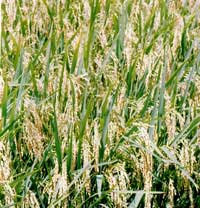 Japanese scientists have recently developed a genetically modified rice that contains a vaccine against hay fever, an allergic reaction caused by pollen or dust.
Japanese scientists have recently developed a genetically modified rice that contains a vaccine against hay fever, an allergic reaction caused by pollen or dust.
Experiments conducted on mice demonstrated that this rice-based vaccine effectively prevents allergic immune responses. Specifically, mice that consumed the genetically modified rice sneezed less when exposed to pollen compared to those that did not consume the rice (control group). It is reported that the team has created a similar type of rice for human consumption and will begin safety trials in the coming years.
According to Dr. Fumio Takaiwa, a member of the research team, the plant-based vaccine offers several advantages over injectable vaccines, most notably being pain-free and free from complicated purification processes. He and his colleagues developed the vaccine using specific protein fragments related to allergies, which were found in the pollen of the Japanese black pine— a common cause of hay fever in the region.
By integrating genetic material from these proteins into the rice genome, they successfully created rice that produces the pollen proteins. Subsequently, a group of mice was fed the rice daily for several weeks before being exposed to the pollen from the black pine. The results showed that these mice produced less histamine—a chemical responsible for hay fever symptoms—and sneezed less than the control group.
Earlier this year, scientists also announced the creation of a genetically modified potato that carries a vaccine against hepatitis B. Trial results indicated that it was effective in the first group of volunteers. Many scientists believe that genetically modified crops are a more efficient and cost-effective way to produce vaccines and pharmaceuticals on a large scale. Traditional vaccines are derived from animal cells or bacteria, requiring extraction and purification processes. Plant-based vaccines eliminate these steps.
Minh Sơn (According to ABCNews, Japan Today)


















































